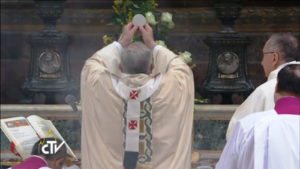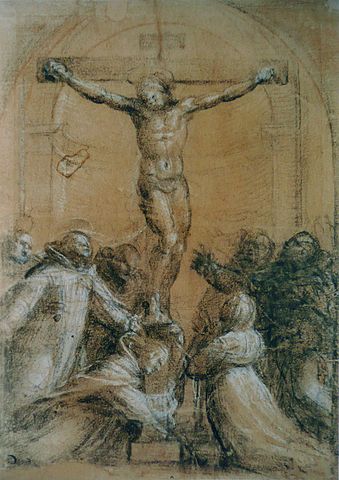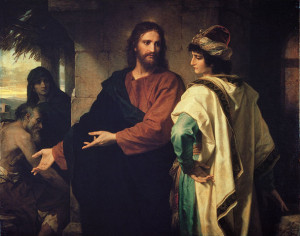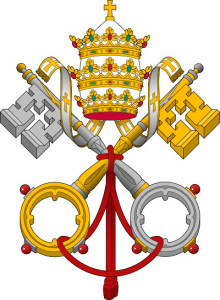Holy Baptism is the basis of the whole Christian life, the gateway to life in the Spirit (vitae spiritualis ianua), and the door which gives access to the other sacraments. Through Baptism we are freed from sin and reborn as sons of God; we become members of Christ, are incorporated into the Church and made sharers in her mission: “Baptism is the sacrament of regeneration through water in the word.”
What is ad orientem and why is it important?

The sacrifice of the Mass is not about us or how we feel. The Mass is about God and how we worship Him. This video is an outstanding explanation of ad orientem — what it is and why it is important.
For as the lightning comes from the east and flashes as far as the west, so will be the coming of the Son of Man.
— Jesus Christ, Matthew 24:27
How to be a better altar server
An reverent, attentive altar server has an important impact on the Mass. The altar server’s reverence helps the whole congregation be more reverent.
Yet another great video from Gabriel Castillo, of TrueFaith.tv:
Withholding Tithes from the Church is Heretical
In America, we are conditioned to vote with our dollars. The classical economic concept of Adam Smith‘s “invisible hand” is deeply engrained in American society, with the concomitant “consumer sovereignty” mentality. However, redirecting our tithes and offerings away from the local parish or diocese is theft, and even heretical, according to Catholic doctrine. Continue reading Withholding Tithes from the Church is Heretical
Evangelism, the Laity and the Order of Preachers

The Order of Preachers was founded by St. Dominic in 1216. Within a few years, the order had organized itself into three branches: the friars, the nuns, and the laity. Each branch of the Order is separately governed under the leadership of the Master of the Order. The branch of the laity are called the “Lay Fraternities of St. Dominic,” “Lay Dominicans,” or formerly the “Third Order of Preachers.” The Lay Dominicans worldwide number approximately 150,000, compared to around than 6,000 Friars.
The Church Exists to Evangelize
Pope Paul VI’s apostolic exhortation, Evangelii Nuntiandi (Evangelism in the Modern World) written 10 years after the close of Vatican II, refocused the Church on its central mission: the eternal salvation of souls. So important is Evangelii Nuntiandi that Pope Francis calls it “the greatest pastoral document that has ever been written to this day.” Address of June 23, 2013, at 2.
Continue reading Evangelism, the Laity and the Order of Preachers
Stop Begging for Money and Teach Stewardship
Home for me is a 16 foot travel trailer at a camping “resort” in San Antonio, Texas. One afternoon last week, I was sitting in my lawn chair under the awning, which serves as my living room, when I saw my friend Adam walk by. He was carrying a plastic bag of Hot Pockets and Cokes he’d bought at the drugstore down the street.
Adam (that’s his real name) is in his early twenties, thin as a rail, and lives alone in a one room cabin down the hill from me. The cabin has no running water, so he uses the camp facilities for the restroom and to shower.
He works for minimum wage on an asphalt crew in the 100 degree Texas summer heat. His thick brown hair is sunbleached to a burnt orange color, because he never wears a hat. I see him most every day as he goes to and from his job. He doesn’t have a car, so a company pickup comes to get him and bring him home. He rides in the back of the truck. He always smiles. I’ve never seen him unhappy.
Anyway, as he was walking by, I said hello and so he stopped to chat. We exchanged some small talk about hot the day was. Gesturing to the computer on my lap, he asked what I was working on. I told him I was writing an article about giving to God and what that means for our salvation. He looked at me like he remembered something, but forgot how he knew. What he said next, in his slow Texas accent, was as lucid, theologically accurate summary of Christian giving as I have ever heard. Continue reading Stop Begging for Money and Teach Stewardship
First Fruits, Sacrifice, and Covenant
Our covenantal relationship with God compels us to offer our “first fruits” to him in sacrifice and praise. The offering of the first fruits is inextricably connected with God’s covenantal relationships. When God covenants with his people, an offering of the “first” acknowledges God’s sovereignty and gives thanks to God from whom all things come.
First Fruits in the New Testament Church
The first century New Testament church understood first fruits offerings as part of God’s plan for the sanctification of his Church. The Didache, commonly known as the “Teaching of the Twelve Apostles,” is the earliest known liturgical writing of the earliest church and was written about 100 A.D. It prescribes offering first fruits for the support of both the clergy and the poor: Continue reading First Fruits, Sacrifice, and Covenant
A Revolution for Eucharistic Reverence
The Eucharist is the source and summit of our faith. Eucharistic reverence is a MUST for us to recapture the authenticity and power of Catholic worship!
Watch this video from Gabriel Castillo (Sugar Land, Texas):
For other powerful videos, go to TrueFaith.tv.
The Theology of Giving
“Good Teacher, what must I do to inherit eternal life?”

When Jesus heard this, he said to him, “There is still one thing lacking. Sell all that you own and distribute the money to the poor, and you will have treasure in heaven; then come, follow me.” But when he heard this, he became sad; for he was very rich.
Jesus looked at him and said, “How hard it is for those who have wealth to enter the kingdom of God! Indeed, it is easier for a camel to go through the eye of a needle than for someone who is rich to enter the kingdom of God.”
Those who heard it said, “Then who can be saved?” He replied, “What is impossible for mortals is possible for God.”
Then Peter said, “Look, we have left our homes and followed you.” And he said to them, “Truly I tell you, there is no one who has left house or wife or brothers or parents or children, for the sake of the kingdom of God, who will not get back very much more in this age, and in the age to come eternal life.”
Luke 18:18-30
The famous story of the rich ruler in Luke’s gospel tells us why we give: to inherit eternal life.
The ruler approached Jesus to learn how to attain eternal life, insisting that he had followed all the commandments since his youth. Jesus then told him, “Sell all that you own and distribute the money to the poor, and you will have treasure in heaven; then come, follow me.” Unable to part with his possessions, the man went away sadly.
In the subsequent exchange with the onlookers and the disciples, Jesus did not mention the needs of the poor. Instead, Jesus emphasized the real reason for giving: the primary purpose of giving is to save the giver’s soul.
Pope Francis recently explained why: “Whenever material things, money, worldliness, become the center of our lives, they take hold of us, they possess us; we lose our very identity as human beings.” Pope Francis, Homily on Sunday, September 29, 2013. By giving in support of the kingdom of God, we reorient our lives to God as the center of our lives.
Of course, God does not need the money. God, being infinite, lacks nothing. If God needed more money, he could simply create it. Instead, he calls us to give for the sake of our own souls.
Does this mean that we can simply spend our way to heaven? No. We are saved by God’s grace through faith in Jesus Christ and through baptism. See John 1:12-18 and Catechism of the Catholic Church ¶¶ 1987-1989. Our charitable giving is part of the cooperation between God’s grace and man’s freedom that is required to repent from our sinful nature and turn towards God’s kingdom. Cf. James 2:14-17. “Justification establishes cooperation between God’s grace and man’s freedom. On man’s part it is expressed by the assent of faith to the Word of God, which invites him to conversion, and in the cooperation of charity with the prompting of the Holy Spirit who precedes and preserves his assent.” Catechism of the Catholic Church ¶ 1993.
The theological foundation of Christian giving
The theology of giving is premised on three concepts:
1. God’s ownership
2. Our stewardship
3. Final accountability
Continue reading The Theology of Giving
Why I believe in the Catholic Church
Jesus Christ is God Himself (John 1:1, Colossians 2:9), incarnate in the human person (John 1:14). Through him, all things were made (John 1:3).

Jesus personally founded one Church , which is his one Body (Romans 12:5, 1 Corinthians 12:12). He directed his Church to “[g]o and make disciples of all nations, baptizing them in the name of the Father, and of the Son, and of the Holy Spirit, and teaching them to obey all that [he] commanded.” Matthew 28:19-20.
Jesus built his Church on the rock of Simon Peter (Matthew 16:18) and on the foundation of the apostles and prophets (Ephesians 2:20). Jesus promised that he would be with his Church until the end of time (Matthew 28:20) and that the gates of hell would never prevail against his Church (Matthew 16:18).
If Jesus was telling the truth, his Church cannot ever fail (because that would imply his absence) or be extinguished (because that would imply that hell had prevailed). Jesus cannot lie, because he is God (cf. Titus 1:2). Consequently, the one Church that Jesus personally founded must be in continuous, visible operation, in direct, unbroken succession from the original apostles, with the seat of Peter being primary.
Continue reading Why I believe in the Catholic Church
